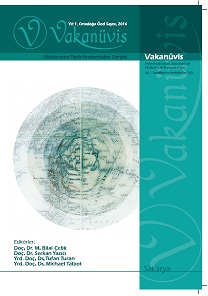Bir Nablus Muharebesi Hikâyesi
A Narrative Of The Battle Of Nablus
Author(s): Fatih Turgay EldemSubject(s): History, Military history, The Ottoman Empire
Published by: Serkan YAZICI
Keywords: Mustapha Kamal Pasha; Marsinli Jamal Pasha; von Sanders Pasha; Sharif Faisal; Megiddo;
Summary/Abstract: The Battle of Megiddo which accelerated the termination of the World War One for the Ottoman Empire was fought between Yildirim Army Group, on behalf of the Ottoman Empire, and Egyptian Expeditionary Force supported by Rebellious Arab Army, in the name of the British Empire, between September 18th and October 31st, 1918 in the Sinai and Palestine Campaign. The most of the Egyptian Expeditionary Force under the command of Edmund Allenby was made up of the British, Australian, New Zealand and Indian Armies that had returned from the Gallipoli Campaign. The Yildirim Army Group commanded by Otto Liman von Sanders consisted of the 4th, 7th, and 8th Ottoman Armies. The 4th Army headquartered in Al-Salt, Jordan and its commander was Jamal (Marsinli) Pasha. Headquartered in Nablus, West Bank, the commandant of the 7th Army was Mustapha Kamal (Ataturk) Pasha. Javat (Chobanli) Pasha was in command of the 8th Army headquartered in Tul Karm, West Bank. At the end of the battle, the 4th, 7th and 8th Armies were all destroyed by the British and Australian aeroplanes’ bombings in such places as Al-Mafraq station, Valley of Faria and Masudiya Crossing respectively. Von Sanders who general-headquartered in Nazareth, Israel narrowly escaped from being captured by the troops of Desert Mounted Corps. Consequently, the Yildirim Army Group suffered a total of 100.000 casualties including dead, missed and prisoner. However, having taken lesson from this battle, Mustapha Kamal Ataturk, the founder of Republic of Turkey, planned and implemented the Great Offensive of War of Independence so as Allenby did. He also realised the importance of air force as a result of extreme suffering of retreating armies from aerial attacks. Thus, after concluding the Independence War successfully, he established the Turkish Aeronautical Association.
Journal: Vakanüvis- Uluslararası Tarih Araştırmaları Dergisi
- Issue Year: 1/2016
- Issue No: Spec.issue
- Page Range: 69-104
- Page Count: 36
- Language: Turkish

